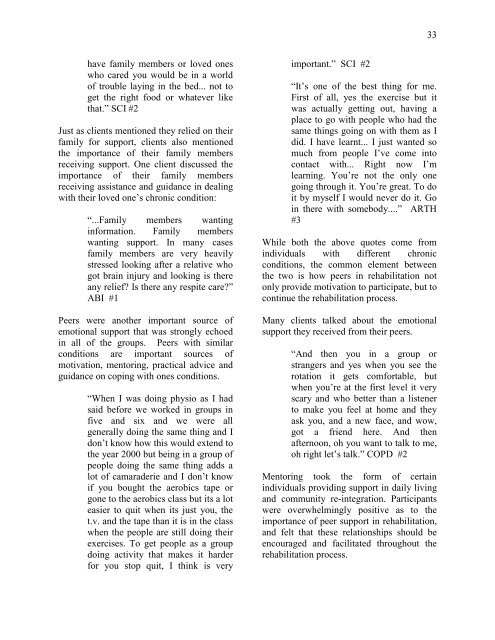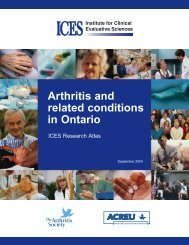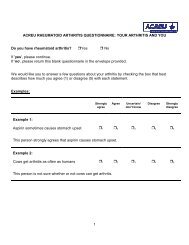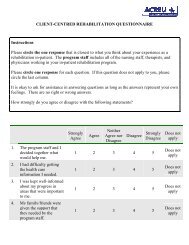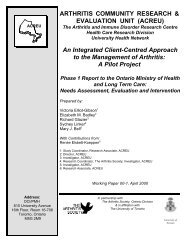Client-Centred Rehabilitation - Arthritis Community Research ...
Client-Centred Rehabilitation - Arthritis Community Research ...
Client-Centred Rehabilitation - Arthritis Community Research ...
Create successful ePaper yourself
Turn your PDF publications into a flip-book with our unique Google optimized e-Paper software.
33<br />
have family members or loved ones<br />
who cared you would be in a world<br />
of trouble laying in the bed... not to<br />
get the right food or whatever like<br />
that.” SCI #2<br />
Just as clients mentioned they relied on their<br />
family for support, clients also mentioned<br />
the importance of their family members<br />
receiving support. One client discussed the<br />
importance of their family members<br />
receiving assistance and guidance in dealing<br />
with their loved one’s chronic condition:<br />
“...Family members wanting<br />
information. Family members<br />
wanting support. In many cases<br />
family members are very heavily<br />
stressed looking after a relative who<br />
got brain injury and looking is there<br />
any relief? Is there any respite care?”<br />
ABI #1<br />
Peers were another important source of<br />
emotional support that was strongly echoed<br />
in all of the groups. Peers with similar<br />
conditions are important sources of<br />
motivation, mentoring, practical advice and<br />
guidance on coping with ones conditions.<br />
“When I was doing physio as I had<br />
said before we worked in groups in<br />
five and six and we were all<br />
generally doing the same thing and I<br />
don’t know how this would extend to<br />
the year 2000 but being in a group of<br />
people doing the same thing adds a<br />
lot of camaraderie and I don’t know<br />
if you bought the aerobics tape or<br />
gone to the aerobics class but its a lot<br />
easier to quit when its just you, the<br />
t.v. and the tape than it is in the class<br />
when the people are still doing their<br />
exercises. To get people as a group<br />
doing activity that makes it harder<br />
for you stop quit, I think is very<br />
important.” SCI #2<br />
“It’s one of the best thing for me.<br />
First of all, yes the exercise but it<br />
was actually getting out, having a<br />
place to go with people who had the<br />
same things going on with them as I<br />
did. I have learnt... I just wanted so<br />
much from people I’ve come into<br />
contact with... Right now I’m<br />
learning. You’re not the only one<br />
going through it. You’re great. To do<br />
it by myself I would never do it. Go<br />
in there with somebody....” ARTH<br />
#3<br />
While both the above quotes come from<br />
individuals with different chronic<br />
conditions, the common element between<br />
the two is how peers in rehabilitation not<br />
only provide motivation to participate, but to<br />
continue the rehabilitation process.<br />
Many clients talked about the emotional<br />
support they received from their peers.<br />
“And then you in a group or<br />
strangers and yes when you see the<br />
rotation it gets comfortable, but<br />
when you’re at the first level it very<br />
scary and who better than a listener<br />
to make you feel at home and they<br />
ask you, and a new face, and wow,<br />
got a friend here. And then<br />
afternoon, oh you want to talk to me,<br />
oh right let’s talk.” COPD #2<br />
Mentoring took the form of certain<br />
individuals providing support in daily living<br />
and community re-integration. Participants<br />
were overwhelmingly positive as to the<br />
importance of peer support in rehabilitation,<br />
and felt that these relationships should be<br />
encouraged and facilitated throughout the<br />
rehabilitation process.


